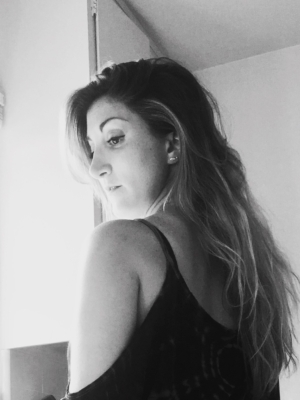Looking Toward My Reflection
My first love was an addict. He was the sneaky kind of addict who was good at hiding, too, at least in the beginning. He wasn’t a falling down junkie; I couldn’t tell by looking at him. I was a typical small town, been-drunk-or-high-many-times-but-always-showed-up-to-school-and-work type of girl, a this-will-never-EVER-become-a-problem-for-me kind of girl. Falling for him was a tumble into the dark unknown; head over feet, into the sensation of only deep inhales. Euphoria muddled the addiction signs, and blurred the edges of his imperfections. Slumped next to me, in pain, my first love anesthetized by addiction. Eventually I realized it was dark because I’d just crash-landed at the bottom of a cavern. I found myself looking up, wincing at scraped knees and bloodied elbows.
His pain swelled so significantly that one June day he jumped off an apartment building balcony. Riddled with stitches, bruises, and contusions, all compounded by his screeching denial. He didn’t remember jumping; he was so high. Or he was too embarrassed to say. When the doctor asked him why he jumped, he paused, shame in his eyes as I squeezed his hand. Men don’t get depressed, his eyes said. I knew then that his depression was the reason he’d turned to substance. I sat with him in that hospital room, holding his hand and his denial in one piece. Somehow his pain became mine. I had no idea that I’d begin to fall apart, piece-by-piece, too.
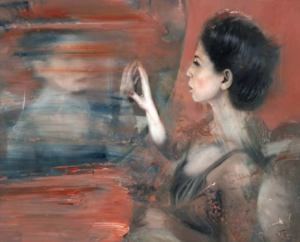 I left him a year later, exhausted from the journey. A cavity, filled with mountainous guilt, remained for having loved him, the thorns still stuck in my heart. Regrets aside, I’d learned love didn’t fix everything; my liberation had been worth the temporary pain. I traveled to Italy, celebrated my single life. Now that I wasn’t worrying every second of the day if I was being lied to, if he’d overdose, if he’d answer his phone, what lurked behind his eyes—my time quickly accumulated. The delicate veil between mourning and healing felt like emancipation, strengthening in time.
I left him a year later, exhausted from the journey. A cavity, filled with mountainous guilt, remained for having loved him, the thorns still stuck in my heart. Regrets aside, I’d learned love didn’t fix everything; my liberation had been worth the temporary pain. I traveled to Italy, celebrated my single life. Now that I wasn’t worrying every second of the day if I was being lied to, if he’d overdose, if he’d answer his phone, what lurked behind his eyes—my time quickly accumulated. The delicate veil between mourning and healing felt like emancipation, strengthening in time.
* * *
There is nothing like the love of a parent for a child. I was fortunate to grow up with two parents who remained married throughout my childhood, were involved in my life, loved me, told me so, and made me feel loved. When I got old enough, I realized my parents weren’t mine anymore, they were just people—who made mistakes, had regrets, and did the best they could. Even then, my dad’s experience was going differently than I had imagined, and I, too, felt the disparity.
A palpability deep in my soul; an imposter had replaced my dad. Years after I dated my addicted ex, my father began to change. We no longer laughed, played video games, or watched baseball together. I couldn’t stand to be in the same room with him anymore; our friendly debates and jokes exchanged for curt hellos and stiff-necked nods. Our relationship had tarnished, had been marked for death, and I couldn’t identify why.
My dad had grown up without his father, who died from lung cancer when he was nine. His mother did her best, but a young widow raising two boys in Brooklyn was challenging. This was the 60s and 70s, and being gay was unacceptable for most, a disgrace to others, especially for good Catholic altar boys. Concealment of a secret began.
One morning I woke up to an empty house. My mother called me, her voice ragged and nasal from crying, as I paced the living room. She told me she’d had a dream my dad was cheating on her with a man. She’d asked him, her voice barely above a whisper, while the world began to rouse outside, while I slept soundly right above them. With a nod, their marriage—thirty years—came to an end. It was the day before Valentine’s Day.
The next three months I avoided him—his calls, texts, and the sunflowers he sent for my birthday. My mother was grieving. I wasn’t sure what to feel, only that it felt like an imposter had replaced me, too. In those months, I regarded myself as an experiment, a mistake. Whether that was true, or even made sense, didn’t matter—it was the aftermath of emotion. The damage those thoughts did to my psyche and self-esteem seemed immeasurable. I was confused, angry, hurt, and grieving, too.
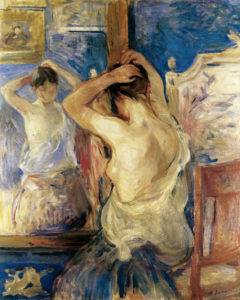 One May day, I came home to find my dad waiting for me. Would I hit him, scream, or throw anything at arm’s reach? I didn’t want to see him, or hear him out. How dare he? I walked in, and sat down, exhaling loudly through my nostrils, like a bull confined to the gate. Rage filled me. But it vanished, as quickly as it had appeared. He began to speak, and then weep. For an instant, a flash, I put my pain aside, and considered his.
One May day, I came home to find my dad waiting for me. Would I hit him, scream, or throw anything at arm’s reach? I didn’t want to see him, or hear him out. How dare he? I walked in, and sat down, exhaling loudly through my nostrils, like a bull confined to the gate. Rage filled me. But it vanished, as quickly as it had appeared. He began to speak, and then weep. For an instant, a flash, I put my pain aside, and considered his.
My dad loved me, I saw it in the tears streaming down his face, how his hands pooled in his lap, shoulders shrugged. “I’ll do anything to have you in my life,” he said. That plead unlocked something deep within me. After years of strife and silent, looming discord, I felt my dad loved me—more than he loved himself.
* * *
What do you say to your last living grandparent?
“There’s not much time,” my mother said through the phone. My grandmother had been getting sicker. “She needs to hear you say it’s okay to go. It has to come from you. I know it’s not easy, but I’m asking you to try for her.”
My body pooled on my living room floor, 2,600 miles away, while I gathered strength. How do you thank someone adequately in words, or measure their impact on your life in the two-minute and forty-six seconds of a memo?
Closure is a healing mechanism, so the experts say. The bittersweet coagulated at the back of my throat: a goodbye I couldn’t vocalize. Maybe saying goodbye warrants bravery deep down inside of me, that I’d forgotten I have.
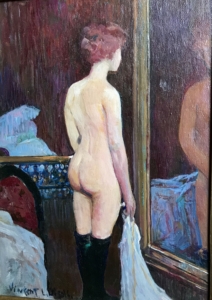 “Hi, Mama,” I began. “It’s your Little Lis. I miss you so much, and want you to know how proud I am to be your granddaughter. And I want you to know that I’ll always cherish the fact that you taught me to be brave, and smart, and funny, that it’s okay to swear a couple of times, if you’re feeling passionate. I was always especially good at that one. You taught me I could do whatever I wanted, you’d always support me; and you always did. And that has shaped me into the woman I am today. I could never thank you enough for that. I’ll never forget it. It’ll always stay with me. But today it’s my turn to support you back. I know how much pain you’re in, and I know you’re trying to hold on. I’m so proud of you, and I think you’re brave, but at this point, you need to know that I support whatever you need to do. If you’re ready to go, I support you. I’m always gonna think you’re the bravest. So now, it’s time to be brave one more time.”
“Hi, Mama,” I began. “It’s your Little Lis. I miss you so much, and want you to know how proud I am to be your granddaughter. And I want you to know that I’ll always cherish the fact that you taught me to be brave, and smart, and funny, that it’s okay to swear a couple of times, if you’re feeling passionate. I was always especially good at that one. You taught me I could do whatever I wanted, you’d always support me; and you always did. And that has shaped me into the woman I am today. I could never thank you enough for that. I’ll never forget it. It’ll always stay with me. But today it’s my turn to support you back. I know how much pain you’re in, and I know you’re trying to hold on. I’m so proud of you, and I think you’re brave, but at this point, you need to know that I support whatever you need to do. If you’re ready to go, I support you. I’m always gonna think you’re the bravest. So now, it’s time to be brave one more time.”
My words held up a mirror and exhibited the same qualities she’d always instilled in me, one last time. Two weeks later, she let go. She found that bravery I’d asked her to, our bravery. Her last lesson to me was how to love myself again.
* * *
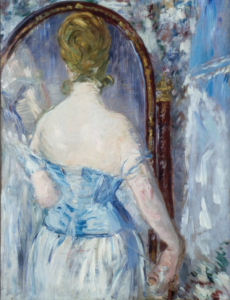 I observe love through exchanges between two: two lovers lying in bed, two parents traveling through life, two generations teaching each other for the last time. But, slowly, I’m learning the love I give to myself is the most important kind.
I observe love through exchanges between two: two lovers lying in bed, two parents traveling through life, two generations teaching each other for the last time. But, slowly, I’m learning the love I give to myself is the most important kind.
In reconnecting these moments, mentally stirring them into a pot, I’ve been thinking about how they made me feel, and what I might glean from them now. I stand over the pot, waiting for the reason to reveal itself in the steam with a hiss. But that method proves too passive, too out of my control.
I keep thinking about that mirror, the one my grandmother taught me to hold up. Though it can be scary to turn toward my reflection, I must remember that truly loving myself means showing myself the same compassion, forgiveness, and grace I’d been so willing to extend to those I love.
I’m making a promise to keep looking toward my reflection, starting now.
Lisa Croce lives in Los Angeles where she is currently an MFA Candidate at Antioch University. She is a blogger and fiction reader for Lunch Ticket. She attributes her award-winning sass to her grandmother and being raised in the northeast. Her greatest passions as a writer are crafting short stories and novels.

